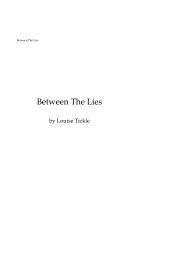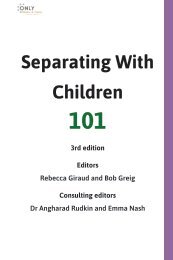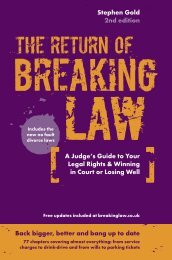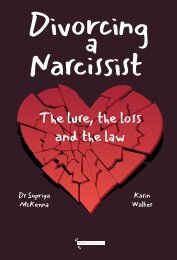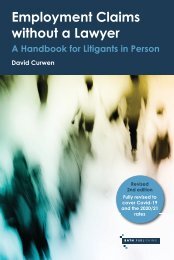Insolvency Made Clear: A Guide for Debtors
Plain English, practical guidance for anyone facing demands over a debt they are struggling to pay.
Plain English, practical guidance for anyone facing demands over a debt they are struggling to pay.
Create successful ePaper yourself
Turn your PDF publications into a flip-book with our unique Google optimized e-Paper software.
<strong>Insolvency</strong> Law <strong>Made</strong> <strong>Clear</strong> – A <strong>Guide</strong> For <strong>Debtors</strong><br />
as an abstract noun, meaning ‘what is good <strong>for</strong> somebody’, as in “this is not in<br />
my interests”.<br />
A ‘judgment’ is the decision of a judge.<br />
A ‘judgment debt’ is a debt which arises out of a court judgment. If person A is<br />
ordered to pay person B, A is the judgment debtor and B is a judgment creditor.<br />
The difference between a judgment debt and a regular debt is only in the difficulty<br />
of disputing a judgment debt, since the court would already have heard the<br />
arguments and made its decision.<br />
The ‘jurisdiction’ of the court is whether the court has the ability to do something.<br />
A ‘liability’ is a legal obligation which someone owes to someone else. It could<br />
be an outstanding debt, but it could also be an obligation to make future payments<br />
or a non-monetary obligation such as to maintain insurance on a flat.<br />
A ‘liquidated’ debt is one that can be quantified. A promise to pay £10,000 is a<br />
liquidated debt, but a claim <strong>for</strong> damages resulting from an accident is not liquidated<br />
until the court determines its value.<br />
‘Liquidation’ is an entirely different concept, and is the word used to describe<br />
the ‘bankruptcy’ of a company.<br />
A ‘liquidator’ is an <strong>Insolvency</strong> Practitioner who is appointed to run a company’s<br />
liquidation.<br />
‘Listing’ is when the court finds time in its diary <strong>for</strong> a hearing.<br />
A ‘litigant in person’ is someone who does not have professional legal<br />
representation.<br />
‘Litigation’ is when someone brings a claim in court.<br />
A ‘moratorium’ is a period when nobody can bring a claim or en<strong>for</strong>ce a debt.<br />
A statement given under ‘oath’ is one where the witness swears to tell the truth,<br />
either while holding a Bible or another sacred text. A non-religious witness can<br />
instead ‘affirm’ their evidence. The difference between an oath and an affirmation<br />
is of no legal importance.<br />
An ‘offence’, as used in this book, is a crime.<br />
The ‘Official Receiver’ (OR) is a qualified <strong>Insolvency</strong> Practitioner who works <strong>for</strong><br />
the Government. The Official Receiver is the first person who takes control after<br />
xxiv



